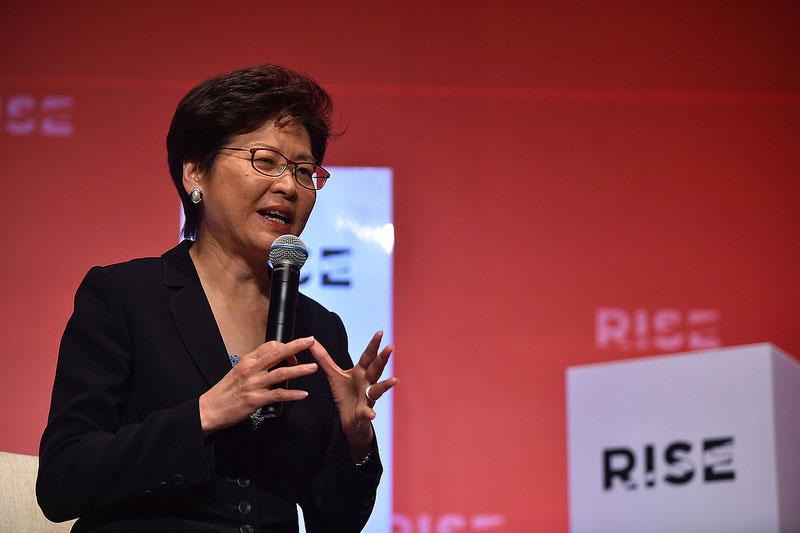Here’s a rundown of Hong Kong’s Chief Executive Carrie Lam’s talk at RISE. From Hong Kong’s plans for nurturing technology and becoming a smart city to discussions on the Greater Bay Area.
In a talk titled “Can Politics Lead on Innovation?”, Carrie Lam and CNBC’s Bernie Low spent the majority of their session discussing Hong Kong’s plans for nurturing innovative startups and attracting tech companies. Highlighting the progress the government has already made in promoting innovation and technology, including investing HKD 78 billion last year alone, committing to building a second science park thrice the size of the original located in Pak Shek Kok, and a fast track immigration arrangement for technology companies recruiting overseas, Carrie repeatedly emphasized her government’s commitment to creating “an environment which is conducive to the development of innovation and technology in Hong Kong.”

Besides boosting Hong Kong’s own appeal to technology companies, the CE is also looking ahead to the opening of two new cross-boundary infrastructures later this year in the Greater Bay Area, which will reduce travel times and encourage more collaborations.
“The Greater Bay area, which is Guangdong, Hong Kong and Macau, is an area with 68 million people, so it’s as big as the United Kingdom, with a GDP of 1.5 trillion US dollars, which is as big as Australia,” she said on the day. “I am very confident that, with the needed policy support and the investment and the promotion, this Guangdong, Hong Kong, Macau Bay area will be a major engine for economic growth in this region.”
She added that the area functions as a good “self-contained formula” for innovation and technology; with the research expertise and business capital present in Hong Kong, combined with the large manufacturing capacity in Mainland cities like Shenzhen, Dongguan, and Zhongsan.
In addition to these technology-focused policies, the pair also talked about the buzz around Xiaomi, which made history on Monday after becoming the first dual-class stock listed at the Hong Kong stock exchange, a feat that would not have been possible if not for new listing rules made by Lam’s government this April.
She explained that, after losing Alibaba’s listing to the New York Stock Exchange in 2014, she felt the need to assemble a Financial Leaders Forum to re-evaluate and make adjustments to the regulations, explaining, “the world is changing, so if we want to stay competitive, especially to stay at the top, then we need to continuously revisit our rules and regulations to make sure that we can adapt to the new changes that have arisen.”
The new listing rules not only allow for weighted voting rights with dual-class stocks, they also allow biotech companies to list in Hong Kong pre-revenue. Lam says they also wish to promote companies who have listed abroad to come back for a secondary listing.
With so many projects and initiatives underway, it is hard to imagine that Carrie Lam has only just finished her first year in office as Chief Executive. As the first female leader Hong Kong has ever had, she affirmed that she has indeed been enjoying her job, and concluded the talk saying, “For those who want to come to Hong Kong, you can be assured that in the next four years, you will have a very energetic leader.”
Related Articles
Logivan: on the ‘RISE’ to recognition
RISE 2019: A Comprehensive Roundup
The Hive x Vivid Invest: The Rise of Management Contracts & Why They’re Mutually Beneficial




